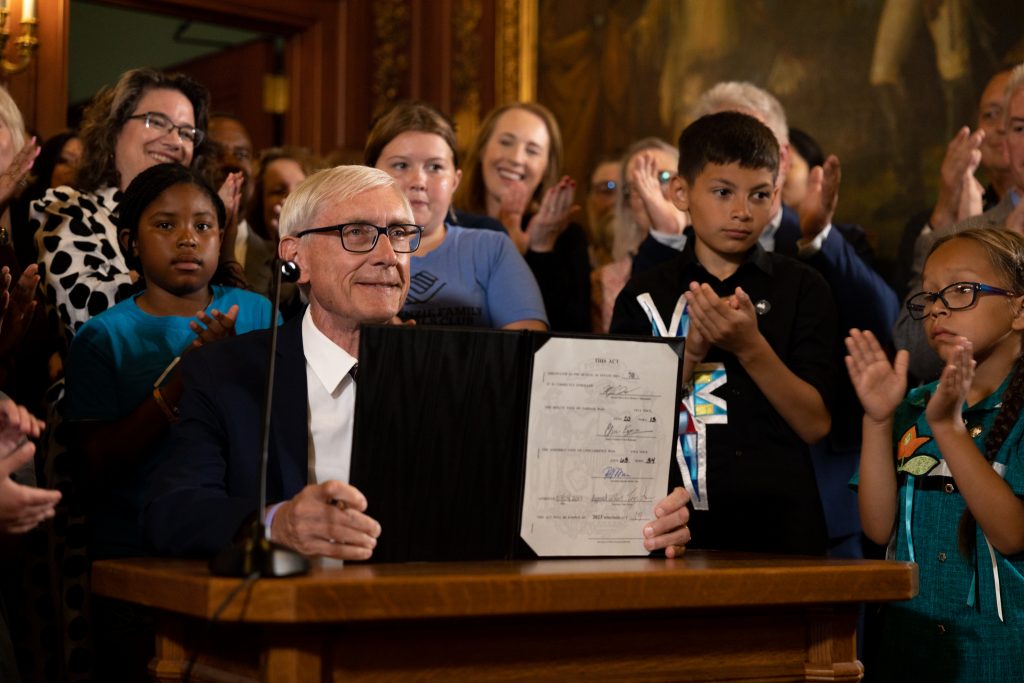Why Republicans Pass Bills They Know Gov. Evers Will Veto
Key part of their strategy to win elections in 2026, hold power in Legislature.

Democratic Wisconsin Gov. Tony Evers displays a two-year budget that he signed July 5, 2023, in Madison, Wis. Evers used his partial veto power to remove tax cuts for the state’s wealthiest taxpayers and protect 180 diversity, equity and inclusion jobs Republicans wanted to cut at the University of Wisconsin. (Drake White-Bergey / Wisconsin Watch)
In the Wisconsin Senate’s last floor session of 2025, lawmakers debated and voted on bills that appear destined for Democratic Gov. Tony Evers’ veto pen.
One of the bills, which passed the Republican-led Assembly in September and is on its way to Evers’ desk, would prohibit public funds from being used to provide health care to undocumented immigrants. Sen. Van Wanggaard, R-Racine, the bill’s Senate author, argued it would protect Wisconsin taxpayers, citing Democratic states like Illinois where enrollment and costs of a health care program for noncitizens far exceeded initial estimates.
But several Senate Democrats lambasted the proposal as a “heartless” attempt by GOP lawmakers to gain political points with their base with 2026 elections around the corner. Sen. Tim Carpenter, D-Milwaukee, hinted at its likely future in the governor’s office.
“It’s going to be vetoed,” Carpenter said.
Plenty of bills in the nearly eight years of Wisconsin’s split government have passed through the Republican-controlled Assembly and Senate before receiving a veto from the governor. Evers vetoed a record 126 bills during the 2021-22 legislative session ahead of his reelection campaign and 72 bills during the 2023-24 session. The governor has vetoed 15 bills so far in 2025, not including partial vetoes in the state budget, according to a Wisconsin Watch review of veto messages. The number is certain to rise, though whether it will approach the record is far from clear.
A few Senate Democrats seeking higher office in 2026 said some recent legislation that is unlikely to make it past Evers, from a repeal of the creative veto that raises school revenue limits for the next 400 years to a bill exempting certain procedures from the definition of abortion, looks like political messaging opportunities to ding Democrats. They anticipate more of those proposals to come up next year.
“For the last eight years we’ve had divided government, but we’ve had a heavily gerrymandered Legislature,” said Sen. Kelda Roys, D-Madison, who is among at least seven candidates running for governor in 2026 and voted against those bills on the floor. “For Republicans in the Legislature, there has been no cost and everything to gain from pursuing the most radical and extreme proposals in their party.”
Evers is not seeking a third term as governor in 2026 and is entering the final year of his current term, which no longer makes him vulnerable to political fallout from vetoing bills. But legislative Democrats, particularly in the Senate where the party hopes to win the majority in 2026, can be forced into difficult decisions in their chambers where Republicans control which bills get votes on the Senate and Assembly floors.
“It was all this political gamesmanship of trying to get points towards their own base and/or put me or others, not just me, into a position to have to make that tough vote,” said Sen. Jeff Smith, D-Brunswick, of the bill banning public dollars spent on health care for undocumented immigrants. Smith, who is seeking reelection in his western Wisconsin district next year, holds the main Senate seat Republicans are targeting in 2026. He voted against the bill.
Smith said the immigration bill saw “a lot of discussion” in the Senate Democratic Caucus ahead of the floor session on Nov. 18, particularly on where Smith would vote given the attention on his seat. The bill passed the chamber on a vote of 21-12 with Democratic support from Sen. Sarah Keyeski, D-Lodi; Sen. Brad Pfaff, D-Onalaska; and Sen. Jamie Wall, D-Green Bay, who are not up for reelection next year but represent more conservative parts of the state.
“Many people thought the easy vote would be to just vote with the Republicans because it’s not going to be signed,” Smith said. “But I’ve still got to go back and explain it to my voters.”
A spokesperson for Majority Leader Sen. Devin LeMahieu, R-Oostburg, did not respond to questions from Wisconsin Watch about how Senate Republicans consider what bills advance to the Senate floor. Neither did a spokesperson for Assembly Speaker Robin Vos, R-Rochester.
In a social media post after the Senate session, Senate President Mary Felzkowski, R-Tomahawk, listed “all the things WI Senate Democrats voted against,” which included “prohibiting illegal aliens from getting taxpayer-funded healthcare.”
Scott Kelly, Wanggaard’s chief of staff, said a potential veto or putting Democrats on the record on certain issues largely doesn’t influence the legislation their office pursues.
“Our job is to pass bills that we think are good ideas that should be law,” Kelly said. “Whether other people support or veto them is not my issue. The fact that Democrats think this is a political ‘gotcha,’ well, that just shows they know it’s an idea that the public supports.”
Not all of the bills on the Senate floor on Nov. 18 seemed aimed at election messaging. The chamber unanimously approved a bill to extend tax credits for businesses that hire a third party to build workforce housing or establish a child care program. In October, senators voted 32-1 to pass a bipartisan bill requiring insurance companies to cover cancer screenings for women with dense breast tissue who are at an increased risk of breast cancer. The Republican-authored bill has yet to move in the Assembly despite bipartisan support from lawmakers there as well.
Assembly Democrats last week criticized Vos and Assembly Majority Leader Rep. Tyler August, R-Walworth, for blocking a vote on Senate Bill 23, a bipartisan bill to expand postpartum Medicaid coverage to new Wisconsin moms. Assembly Minority Leader Rep. Greta Neubauer, D-Racine, in a press conference at the Capitol called the move “pathetic.”
But health care is a top issue for Democratic voters and less so for Republicans, according to the Marquette University Law School Poll conducted in October. Illegal immigration and border security are the top issue for Republican voters in Wisconsin. About 75% of GOP voters said they were “very concerned” about the issue heading into 2026, though only 16% of Democrats and 31% of immigrants said the same.
Barry Burden, director of the Elections Research Center and political science professor at the University of Wisconsin-Madison, said political messaging votes can have impacts on elections, especially in what will be some of the close Senate races in 2026.
“It’s kind of a messaging opportunity, not really a policymaking opportunity. It’s also maybe a way for Republicans to let off some steam,” Burden said. “They have divisions within their own caucuses. They have disagreements between the Republicans in the Assembly, Republicans in the Senate. They can never seem to get on the same page with a lot of these things, and there are often a few members who are holding up bills. So, when they can find agreement and push something through in both chambers and get near unanimous support from their caucuses, that’s a victory in itself and maybe helps build some morale or solidarity within the party.”
This article first appeared on Wisconsin Watch and is republished here under a Creative Commons Attribution-NoDerivatives 4.0 International License.![]()
If you think stories like this are important, become a member of Urban Milwaukee and help support real, independent journalism. Plus you get some cool added benefits.




















I often wonder what the state of the State would be right now if ReThuglicans actually did work to make life better for its citizens, rather than the kind of underhanded, Snidely Whiplash twirl-your-mustache chicanery they seem hellbent to create each day they draw breath.
Democrats called this bill “heartless.” But it’s more than that. RRRs (radical reactionary republicans) do not seem to understand the economic fallout of this bill is higher healthcare costs for everyone. Hospitals are required to treat anyone who comes to their ERs. This regardless of whether they have insurance or are able to pay. When we deny healthcare to immigrants (legal or illegal) those expenses are passed on to everyone as high costs.
The more people we deny healthcare, the higher the cost of uncompensated goes up. To pay for uncompensated care, hospitals raise care costs for everyone else. So, Wisconsin residents with employer sponsored health insurance will see higher premiums, deductibles, and out-of-pocket expenses.
Compassion and generosity are more economically sound than the policies of RRRs in Wisconsin and the entire country. What’s more, when families are forced to choose between housing/food and healthcare, this can (and has in the past) in dampening economic growth and recession.